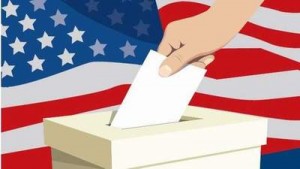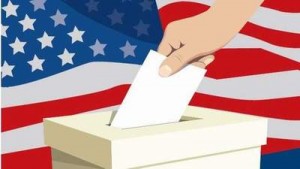Khaleej Times
Bruce Stokes
The US political primary election season is in full swing as Americans choose candidates for the presidency of their nation and, arguably, the job of de facto leader of the world. In the wake of recent primaries in vote-rich states such as Florida and Ohio, Republican candidate Donald Trump has a commanding lead over his rivals Senator Ted Cruz and Governor John Kasich. Democratic front-runner Hillary Clinton has an even larger advantage over her challenger Senator Bernie Sanders. To quote the American baseball player Yogi Berra, “it ain’t over ’til it’s over,” but the field finally seems to be sorting itself out.
To date, the campaign debate has been dominated by multiple themes that could ultimately impact people outside the United States – trade, immigration and terrorism, to name just a few. Americans’ attitudes on these issues could well influence the outcome in November. And the positions the candidates take on these issues may foreshadow, or constrain, what policies the next US president will pursue. Moreover, the mood of the electorate may influence votes in Congressional elections for both the US House of Representatives and Senate, reinforcing foreign-policy choices made by the new president.
Trade is a recurrent campaign theme, despite the fact that global trade ranks low overall on the American public’s list of concerns, as registered by a Pew Research Center survey: 31 per cent rate it as a top priority. Candidates in both parties have repeatedly tied the issue to jobs and the economy and promised to be tougher on trade, especially with regard to China.
Real estate developer and television celebrity Trump has promised to impose a 45 per cent tariff on imports from China. Clinton has pledged to crack down on Chinese currency manipulation that gives Chinese products an unfair competitive advantage. Sanders, Trump and Clinton have repeatedly attacked the Trans-Pacific Partnership trade agreement.
But the public is divided on the overall economic impact of Washington signing free trade deals, like the Trans-Pacific Partnership: 31 per cent suggest such agreements make the economy grow, 34 per cent say they slow the economy down.
Moreover, on the politically potent issues of jobs and wages, 46 per cent of Americans voice the view that trade deals lead to job losses in the United States, while the same percentage says they lower US wages. Only 11 per cent think trade raises wages and just 17 per cent suggest it generates jobs.
Americans are critical of trade with Beijing: 52 per cent describe the US trade deficit with China – the largest US merchandise trade deficit – as a very serious problem.
On immigration, roughly half, or 51 per cent, of Americans think dealing with immigration should be a top priority for Congress and the White House. That emphasis is up from 41 per cent in 2009 at the beginning of the Obama administration. And it’s a highly partisan issue: 66 per cent of Republicans give it priority, but only 43 per cent of Democrats.
Given such partisanship, it may be no surprise that Trump has called for building a wall along the US border with Mexico and deporting the 11 million undocumented immigrants in the country. Clinton, on the other hand, has advocated a path to full and equal citizenship for such immigrants.
Partisanship also manifests itself on how to handle illegal immigration. Contrary to what one might assume based on many headlines, less than half, or 46 per cent, of Americans favour building a fence along the entire Mexican border.
CIA director John Brennan told CBS news program “60 Minutes” in February that attempts by Daesh to attack the United States are “inevitable.” A number of GOP presidential candidates have already staked out “get tough” positions on terrorism and Muslims. Senator Ted Cruz of Texas, for example, has proposed carpet bombing the Daesh. Trump has advocated temporarily banning all Muslims from entering the country. If another terrorist attack happens ahead of the election, fears of terrorism and what to do about it could frame political discourse and favour the candidate deemed strong.
Concern about terrorism is already relatively high and variable. Three-quarters of those surveyed in January 2016 by the Pew Research Center said that defending the nation against terrorism should be the top priority for the Obama administration and Congress – a particular concern among Republicans, 87 per cent, but also troubling for Democrats, 73 per cent.
The intensity of public unease about terrorism and the tendency of such fears to spike in the wake of terrorist attacks, suggest that if John Brennan is right and additional terrorist incidents are inevitable, terrorism could become the disruptive political issue on both sides of the Atlantic in 2016.
US presidential elections are decided on a number of issues, often the state of the economy. But this year, a number of international concerns about negative consequences of globalisation including trade, immigration and terrorism are prominent in the political debate. History suggests that the US election will not turn on any of these issues alone, but they may well influence the outcome. And it is people outside the United States who then must also deal with the consequences.





